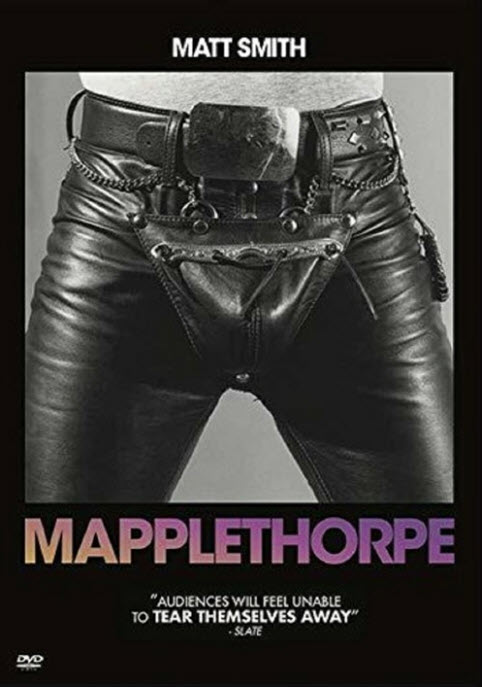(2019, 102 min)
Country: U.S.
Director: Ondi Timoner
Studio: Samuel Goldwyn Home Entertainment
Language: English
SYNOPSIS: Arguably one of the most significant artists of the 20th century, Robert Mapplethorpe (played by Matt Smith of "The Crown" and "Dr. Who" fame) discovered himself both sexually and artistically in New York City throughout the '70s and '80s. Filmmaker Ondi Timoner explores Mapplethorpe's tumultuous life from moments before he and Patti Smith (Marianne Rendon) moved into the famed Chelsea Hotel, home to a world of bohemian chic. Here he begins photographing its inhabitants and his newfound circle of friends including artists and musicians, socialites, film stars and members of the S&M underground. Shockingly erotic, his controversial art is rejected by gallery owners, until he meets Sam Wagstaff (John Benjamin Hickey), a wealthy collector who becomes his lover and financial supporter. The film explores the intersection of Mapplethorpe's art and his sexuality along with his struggle for mainstream recognition. Mapplethorpe offers a nuanced portrait of an important artist at the height of his craft and of the self-destructive impulses that threaten to undermine it all.
REVIEW:
The statement Robert Mapplethorpe made with his photographs was practically self-evident. Every one of his pictures says “I think this is beautiful.” But the statement is followed by a question: “Don’t you?” Seen more than one at a time, his images create provocative, often startling juxtapositions. Consider the spadix of a white calla lily emerging from the center of the flower, next to, say, a man’s penis hanging outside the unzipped pants of a suit. Mapplethorpe’s question became one of the most controversial in modern art. And one that continued to linger long after his death in 1989, at age 42, from AIDS.
“Mapplethorpe,” directed by Ondi Timoner, is a fictionalized biography of the photographer that is most alive when it’s putting its subject’s pictures on the screen, which it does often. And should have done more, because the movie is otherwise as timid as its subject was bold. Beginning with young Mapplethorpe in uniform as an R.O.T.C. cadet at Pratt, it cuts to some “New York City! Wow!” archival footage before the rebellious Robert meets cute with the poet Patti. The alliance between Mapplethorpe and the future rock star Patti Smith was movingly memorialized and mythologized by Smith herself in the 2010 book “Just Kids.” It came as both a surprise, and maybe not so much of one, to be informed in its pages that Smith was the practical one in the relationship. For all that, the art-worshipping duo were fierce nonconformists.
“Mapplethorpe” does something I thought impossible: It makes Smith and Mapplethorpe kind of boring. The scene in which they dance together to a Tim Hardin record could be dropped into the middle of an episode of “This Is Us” and you’d never know the difference. (Patti is played, with a blandness that’s near-hilarious, by Marianne Rendón.)
The movie soon settles into a conventional “and then this happened” structure. Robert expands his sexual parameters, Robert gets a Polaroid camera, Robert meets Sam Wagstaff, who is to become a lover and patron, and so on.
In its respect for Mapplethorpe the artist, or maybe because of something less salutary, the movie hogties itself into passivity, never bothering to turn Robert into any kind of character. Viewers familiar with Mapplethorpe’s work are expected to sit up and say “Foreshadowing!” when Robert asks Sandy Daley, who gives him that Polaroid, “Can I take a picture of your flowers?”
But other than that, the script, by Timoner and Mikko Alanne (adapted from a prior screenplay by Bruce Goodrich), avoids creative extrapolation with respect to Mapplethorpe’s inner life. This gives Matt Smith, in the title role, not a lot to do. The English actor has a physical resemblance to the film’s subject and is clearly both game and able, so that’s a shame.
-- Review by Glenn Kenny, New York Times (https://www.nytimes.com)




